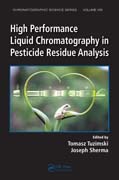
High Performance Liquid Chromatography in Pesticide Residue Analysis
Tuzimski, Tomasz
Sherma, Joseph
Covers how to choose the optimal conditions of the chromatographic process for separation, identification, and quantitative determination of pesticides Presents the kinetic study of pesticides, their degradation and fragmentation in the environment, and HPLC methods applied in pesticide residue analysis Covers a wide spectrum of applications of HPLC and ultra-performance liquid chromatography (UPLC or UHPLC) Reviews the pros and cons of HPLC versus other modern analytical methods for determination of pesticides Discusses how to choose the mode of HPLC for analysis of pesticides on the basis of the properties of analytes or/ of the matrix Summary HPLC is the principal separation technique for identification of the pesticides in environmental samples and for quantitative analysis of analytes. At each stage of the HPLC procedure, the chromatographer should possess both the practical and theoretical skills required to perform HPLC experiments correctly and to obtain reliable, repeatable, and reproducible results. Developed to serve as a detailed practical guide, High Performance Liquid Chromatography in Pesticide Residue Analysis is a comprehensive source of information and training on state-of-the-art pesticide residue methods performed with the aid of HPLC. The book presents the pros and cons of HPLC as a flexible and versatile separation and analysis tool with multiple purposes and advantages in investigations of pesticides for food and plant drugs standardization, promotion of health, protection of new herbal medicines, and more.
- ISBN: 9781466568815
- Editorial: CRC PRESS LLC
- Encuadernacion: Tela
- Páginas: 582
- Fecha Publicación: 20/05/2015
- Nº Volúmenes: 1
- Idioma:
